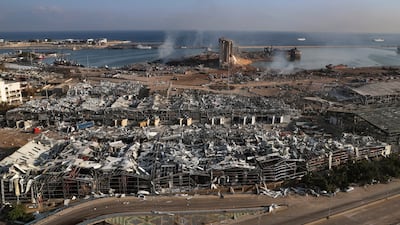A Lebanese man who was critically injured in the massive explosion at Beirut’s port last year died on Wednesday, nearly 15 months after the blast, his cousin said.
Abbas Mazloum, 45, was at work at a restaurant near the port when the blast occurred in August last year, throwing him into a wall. He suffered severe spinal injuries and a head wound that required 45 stitches.
The father of five was paralysed and mostly bed-ridden since the blast. Last month, he underwent a back operation and more recently he became ill and developed a fever.
That led to his death on Wednesday morning in his hometown of Brital in eastern Lebanon, his cousin Noura Mazloum told AP.
“His immunity had become so weak since the explosion,” Ms Mazloum said.
She said her cousin was buried in Brital’s cemetery on Wednesday afternoon.
Mazloum’s death brings to at least 216 the number of people killed by the blast, official records show.
The explosion injured about 6,000 people, many of whom were hit with broken glass, flying objects and debris.
On August 4, 2020, hundreds of tonnes of ammonium nitrate, a highly explosive material used in fertilisers, ignited after a massive fire at the port.
It later emerged that the chemicals had been improperly stored in a port warehouse for years, and that senior political and security officials knew of its existence and did nothing about it.
More than a year later, no one has been held to account for the explosion.
The lead judge investigating the blast had to suspend his work in the case at least three times so far, amid legal challenges from politicians and a growing campaign by Lebanon’s political class against him.
Tarek Bitar is the second judge to lead the complicated investigation, from which his predecessor was removed after similar legal challenges by senior officials he had accused of negligence.
Lebanon’s former prime minister Hassan Diab filed a lawsuit on Wednesday, saying Mr Bitar did not have the jurisdiction to prosecute him.
The move by Mr Diab, who was charged by Mr Bitar earlier, came a day before he was supposed to be questioned by the judge, although he was not likely to show up.
Politicians opposed to Mr Bitar say that officials holding the top posts in the country, as well as ministers and legislators, should be questioned and tried by a special tribunal for them.
A protest organised by the militant Hezbollah group and its allies against the judge this month led to the worst clashes in the capital in years, killing seven people and wounding dozens.
On the first anniversary of the blast, Abbas Mazloum told the daily An-Nahar that he expected there would be no justice in the case.
He spoke of many other explosions that went unpunished in Lebanon over the past decades.
When asked if he had faith in his country, Mazloum said: “Not at all.
“I lost everything in my life. I am still breathing. If we get justice, I will get my rights. They are my children’s rights.”
In September a man, 35, died at his family’s home in Beirut after suffering severe injuries in the blast.


